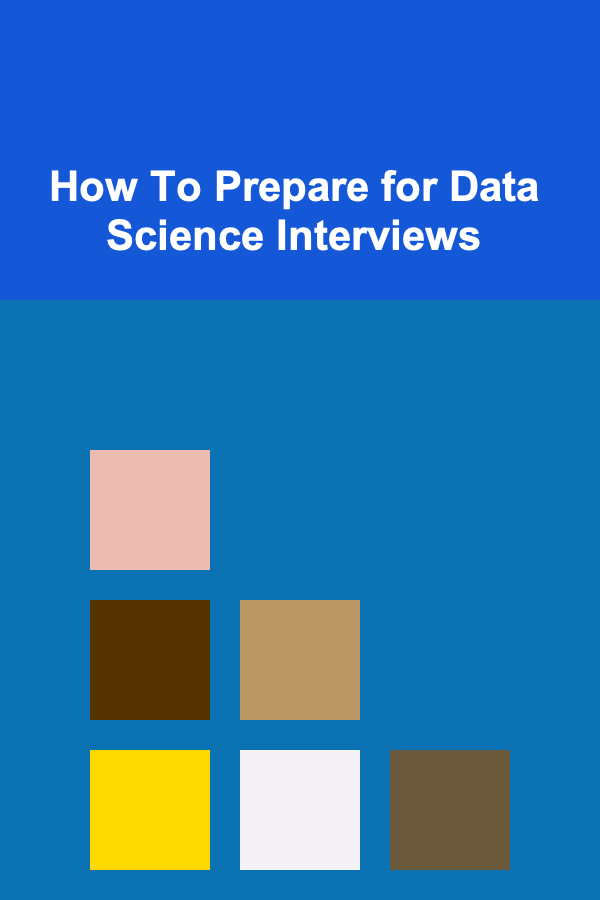
How To Prepare for Data Science Interviews
ebook include PDF & Audio bundle (Micro Guide)
$12.99$11.99
Limited Time Offer! Order within the next:

Data science has become one of the most exciting and lucrative fields in recent years, with companies across industries seeking individuals who can derive insights from complex datasets to drive decision-making. However, landing a data science job is not easy --- especially considering the competitive nature of the field. Preparing for a data science interview involves much more than just knowing algorithms and coding. It requires a mix of technical knowledge, problem-solving skills, and the ability to effectively communicate insights.
In this comprehensive guide, we'll cover the steps necessary to successfully prepare for a data science interview. Whether you're a fresh graduate or a seasoned professional looking to transition into data science, this article will provide valuable insights to help you perform well in interviews.
Understand the Role
Before diving into preparation, it's crucial to understand the specific role you're applying for. Data science is a broad field, and there are several different job titles, such as Data Scientist, Data Analyst, Machine Learning Engineer, and Data Engineer. Each of these roles focuses on different aspects of working with data.
- Data Scientist: Primarily responsible for extracting insights from data using a variety of statistical, analytical, and machine learning techniques.
- Data Analyst: Focuses on interpreting data, generating reports, and visualizing findings. They often use tools like Excel, SQL, and Tableau.
- Machine Learning Engineer: Specializes in developing machine learning models and systems to deploy them in production.
- Data Engineer: Deals with building and maintaining the infrastructure necessary for collecting, storing, and processing data at scale.
Depending on the role you're applying for, the interview preparation will vary. Understanding the job description and the skills required for the position is the first step in the interview preparation process.
Sharpen Your Technical Skills
Programming
Data science interviews typically include coding tests to assess your proficiency in programming. The most common languages used in data science are Python and R, with Python being the most widely used due to its versatility and the large number of data science libraries available. Make sure you are proficient in the following:
- Python: Familiarize yourself with libraries like Pandas, NumPy, Scikit-learn, Matplotlib, and Seaborn. These are essential for data manipulation, model building, and visualization.
- R: R is still widely used in academia and some industries, particularly for statistical analysis and visualization. Familiarize yourself with libraries like dplyr, ggplot2, and caret.
- SQL: Data scientists often need to extract data from relational databases, making SQL an essential skill. Be comfortable with complex queries, joins, groupings, and aggregations.
- Other Languages: Some companies may ask for experience with other languages like Java, Scala, or Julia, especially if the role involves deploying machine learning models or working with big data.
Data Structures and Algorithms
A key part of many data science interviews is assessing your problem-solving ability through algorithms and data structures. This is particularly important in interviews for tech giants like Google, Facebook, and Amazon. Focus on:
- Arrays and Strings: Understand operations like searching, sorting, and manipulation of arrays and strings.
- Linked Lists: Learn the different types of linked lists (singly, doubly) and operations such as reversal and sorting.
- Trees and Graphs: Be comfortable with binary trees, search algorithms (BFS, DFS), and graph-related problems (Dijkstra's algorithm, topological sorting).
- Hash Tables: Study hash maps and hash sets, and practice problems related to them.
- Dynamic Programming: This is a particularly important area for problem-solving in data science. Practice problems like Fibonacci, Knapsack, and Coin Change.
How to Practice:
- LeetCode: A popular platform for coding problems.
- HackerRank: Focuses on algorithms and data structures.
- Codewars: Offers a variety of problems to improve your coding skills.
- InterviewBit: Another platform with data science-focused problems.
Machine Learning Fundamentals
You should be well-versed in machine learning concepts, as this will likely be a major part of your interview. Some important topics to review include:
- Supervised vs. Unsupervised Learning: Understand the differences and be able to give examples of algorithms for each.
- Common Algorithms: Study algorithms like linear regression, logistic regression, decision trees, random forests, k-means clustering, and k-nearest neighbors (KNN).
- Model Evaluation: Know how to evaluate a model's performance using metrics like accuracy, precision, recall, F1-score, ROC curves, and AUC.
- Bias-Variance Tradeoff: Understand the concept and how it impacts model performance.
- Cross-Validation: Familiarize yourself with techniques like k-fold cross-validation and leave-one-out cross-validation.
- Overfitting and Underfitting: Know how to detect and address overfitting and underfitting in models.
Advanced Machine Learning
For more advanced data science positions, you may be asked about deep learning, natural language processing (NLP), or reinforcement learning. Be familiar with the following topics:
- Neural Networks: Understand the basic building blocks of neural networks and how they work.
- Convolutional Neural Networks (CNNs): Useful for image-related problems.
- Recurrent Neural Networks (RNNs): Important for sequential data like time series or text.
- Transformer Models: Familiarity with architectures like BERT or GPT, especially if you're applying for NLP-related positions.
- Reinforcement Learning: Understand key concepts like Q-learning, policy gradients, and reward systems.
Prepare for Behavioral Interviews
In addition to technical interviews, data science positions often include behavioral interviews to assess whether you're a good fit for the company's culture and team. Behavioral interviews typically focus on your past experiences, problem-solving abilities, and how you approach challenges. Here are some tips for excelling in behavioral interviews:
Common Behavioral Questions
- Tell me about a time when you solved a difficult problem.
- Describe a situation where you worked with a team to achieve a goal.
- Tell me about a time when you had to learn something new to complete a project.
- How do you approach a problem when you don't know the solution?
- Describe a challenging project you worked on and the outcome.
How to Prepare
- STAR Method: Structure your answers using the STAR method (Situation, Task, Action, Result) to clearly explain your experiences and outcomes.
- Showcase Your Skills: Focus on how your skills and experiences align with the job description. For example, if you're applying for a machine learning role, highlight your experience with model building and optimization.
- Be Honest: Don't exaggerate your experiences. If you don't know the answer to a question, it's okay to say you don't know, but show a willingness to learn.
Communication Skills
In addition to technical prowess, data scientists need strong communication skills. You must be able to explain complex data analysis in a way that non-technical stakeholders can understand. Here are some tips for improving your communication skills:
- Practice Explaining Complex Concepts: Practice explaining technical concepts, such as machine learning algorithms or data processing steps, in simple terms.
- Prepare for Data Science Case Studies : Some interviews include data science case studies where you must analyze a dataset and present your findings. Practice explaining your thought process and approach to solving the problem. This may involve:
- Cleaning the data
- Selecting appropriate features
- Choosing a model
- Evaluating the model
- Interpreting the results
- Visualizations: Be prepared to create and interpret visualizations (charts, graphs) to present your findings in an accessible manner. Tools like Matplotlib, Seaborn, or Tableau may be used to create these visuals.
Mock Interviews
Mock interviews are an excellent way to practice and get feedback before your real interview. Here are a few ways to do this:
- Peer Interviews: Practice with a friend or colleague who is also preparing for interviews. This can help simulate a real interview environment.
- Interview Coaching Services : You can hire a coach or use services like Pramp or Interviewing.io, where you'll conduct mock interviews with experienced professionals.
- Record Yourself: Record yourself answering behavioral and technical questions. Listening to yourself can help you identify areas for improvement.
Review Your Past Projects
Be ready to discuss your past work and projects, as these are often a key component of data science interviews. If you've worked on any relevant projects, be sure to:
- Showcase Results: Highlight how your work led to specific outcomes. For example, did you improve business metrics or solve a significant problem?
- Discuss Challenges: Be open about the challenges you faced during the project and how you overcame them.
- Demonstrate the Process: Talk about how you approached the problem from start to finish, including data collection, analysis, model selection, and deployment.
Keep Up With the Latest Trends
Data science is a rapidly evolving field, so staying up-to-date with the latest trends, research, and tools is important. Consider reading blogs, attending conferences, and following thought leaders in the industry. Some good sources include:
- Medium: Many data scientists write in-depth articles on various topics.
- Kaggle: Participate in competitions and learn from the solutions shared by other data scientists.
- Research Papers: Read papers from conferences like NeurIPS, ICML, and CVPR.
Relax and Be Confident
Finally, the most important piece of advice is to remain calm and confident during your interview. Confidence comes from thorough preparation, so trust in your knowledge and abilities. Remember, interviews are a two-way process. Not only are the interviewers evaluating you, but you are also evaluating the company and its culture.
Conclusion
Preparing for a data science interview is a multi-faceted process that requires both technical expertise and the ability to communicate effectively. By understanding the role, sharpening your technical skills, practicing behavioral questions, and engaging in mock interviews, you can significantly improve your chances of success. Ultimately, the key to excelling in a data science interview is thorough preparation, confidence, and the ability to showcase your skills and experiences in a way that aligns with the company's needs. With these steps, you will be well on your way to securing your next data science position.

Customer Journey Mapping: A Comprehensive Guide for Customer Insights Analysts
Read More
How to Invest in Real Estate Without a Lot of Money
Read More
The Game Developer's Guide: Mastering the Art of Game Design and Programming
Read More
How to Use VR for Employee Training and Development
Read More
How To Master Storytelling in Your Small Business Marketing
Read More
10 Tips for Excelling in a Specific PA Specialty (e.g., Emergency Medicine)
Read MoreOther Products

Customer Journey Mapping: A Comprehensive Guide for Customer Insights Analysts
Read More
How to Invest in Real Estate Without a Lot of Money
Read More
The Game Developer's Guide: Mastering the Art of Game Design and Programming
Read More
How to Use VR for Employee Training and Development
Read More
How To Master Storytelling in Your Small Business Marketing
Read More